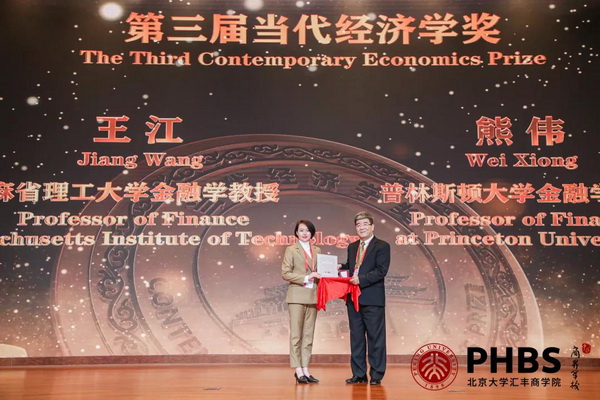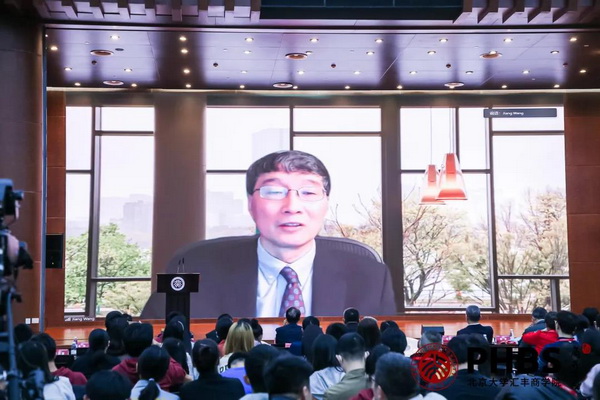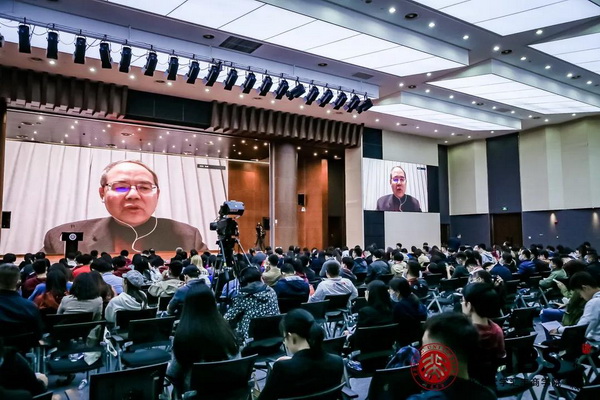The 20th China Economics Annual Conference and the Award Ceremony of Contemporary Economics Prize were held in Shenzhen on the evening of December 5th. Professor Jiang Wang (Chair of Academic Council at Shanghai Advanced Institute of Finance (SAIF) at Shanghai Jiao Tong University and Mizuho Financial Group Professor at Sloan School of Management, MIT) and Professor Wei Xiong (Professor of Finance at Princeton University) jointly won the 3rd Contemporary Economics Prize in 2018. Chun Chang (Executive Dean and Huifu Chair Professor of SAIF), Qiao Liu (Dean of the Guanghua School of Management, Peking University), and several Nobel laureates in Economics were invited to deliver congratulatory speeches.
Established and selected by the National Economics Foundation, the Contemporary Economics Prize is designed to encourage theoretical innovation and drive economic science. By recognizing Chinese scholars who have made outstanding contributions in the field of economics, it motivates and promotes Chinese economists to contribute to the development of economic science. At this ceremony, in addition to Professor Jiang Wang and Professor Wei Xiong (who were jointly awarded the 3rd Contemporary Economics Prize in 2018), Professor Shangjin Wei (Tenured Professor at Columbia University) and Professor Yifu Lin (Boya Chair Professor and Dean of the Institute of New Structural Economics at Peking University) were also awarded the 4th Contemporary Economics Prize in 2019.

When announcing the prizes, Professor Bin Xia (Chairman of the National Economics Foundation and Counselor of the State Council) pointed out that Professor Jiang Wang systematically introduced market friction into the new classical capital market theory to create a new theoretical framework for asset pricing and made outstanding contributions to the development of economic theory.
The research findings include: constructing an equilibrium model that reflects the actual trading needs of market participants; providing a new framework for analyzing the characteristics of market equilibrium trading volume and asset prices; providing new explanations for important phenomena such as market bubble and collapse, the volume-price relationship between interest rate and the stock market, and the liquidity premium of assets; offering a new foundation of theoretical and empirical analysis for market liquidity and its systematic risks by systematically studying market liquidity from the perspective of market friction; and analyzing the possible loss of market effectiveness caused by various market frictions and defects and the corresponding regulatory and policy solutions.

Due to COVID-19, Professor Jiang Wang, who lives in the United States, was unable to attend the award ceremony in person. When he delivered the award-winning speech via video conferencing, he expressed his pleasure at winning the prize and his sincere thanks to the National Economics Foundation, guests, and his mentors, research partners, colleagues, students, and family members. He said that one of the key reasons why the Foundation awarded the 2018 Prize to the financial sector was because of the importance of finance.
Professor Jiang Wang expressed the need for more ambitious talent to join in this cause and expounded upon the importance of modern finance. Finance plays an essential role in the modern economy, which is not only the core platform to regulate economic resources, but also the main driving force for economic development. As a key component of economics, modern finance theory has not only led many revolutions in the financial sector, but also greatly enriched economics over the past 7 decades. Furthermore, China's economic development is now undergoing fundamental changes: from scale to quality and from investment-driven to innovation-driven, which relies on the support and promotion of a modern financial system.
Later, many well-known economists congratulated Professor Wang. Professor Thomas Sargent, 2011 Nobel Laureate in Economics, stated that Professor Wang has made great achievements in promoting the cognitive expansion and pricing of financial markets. Professor Lars Peter Hansen, 2013 Nobel Laureate in Economics, mentioned that Professor Wang attaches great importance to empirical evidence and focuses on theoretical applications, opening up a new direction for financial market research. Professor Qiao Liu, Dean of Guanghua School of Management at Peking University, affirmed the significance of Professor Wang’s research to the reform and development of China's financial markets.

In his congratulatory speech, Professor Chun Chang (Executive Dean and Huifu Chair Professor of SAIF), not only recognized Professor Wang’s pioneering and practical academic research, but also especially praised Professor Wang for his great contributions to China's modern economic and financial education.
As for the development of economic and financial disciplines in China, Professor Chang pointed out that today’s rapid development of information and digital technologies has wrought great challenges upon economic and financial research. Under new patterns of social exchange and cooperation, economists and financial researchers must reconsider the traditional theoretical definition of these boundaries between the state, public and private sectors, and markets and enterprises. These studies call for a problem-driven mindset and global vision. Only in this way can we truly drive the development of economic and financial science. Finally, he hoped and believed that — with continuous development, openness, and strength — the Chinese research community will become part of mainstream global research and will make further and greater contributions to the global economy and to finance itself.






